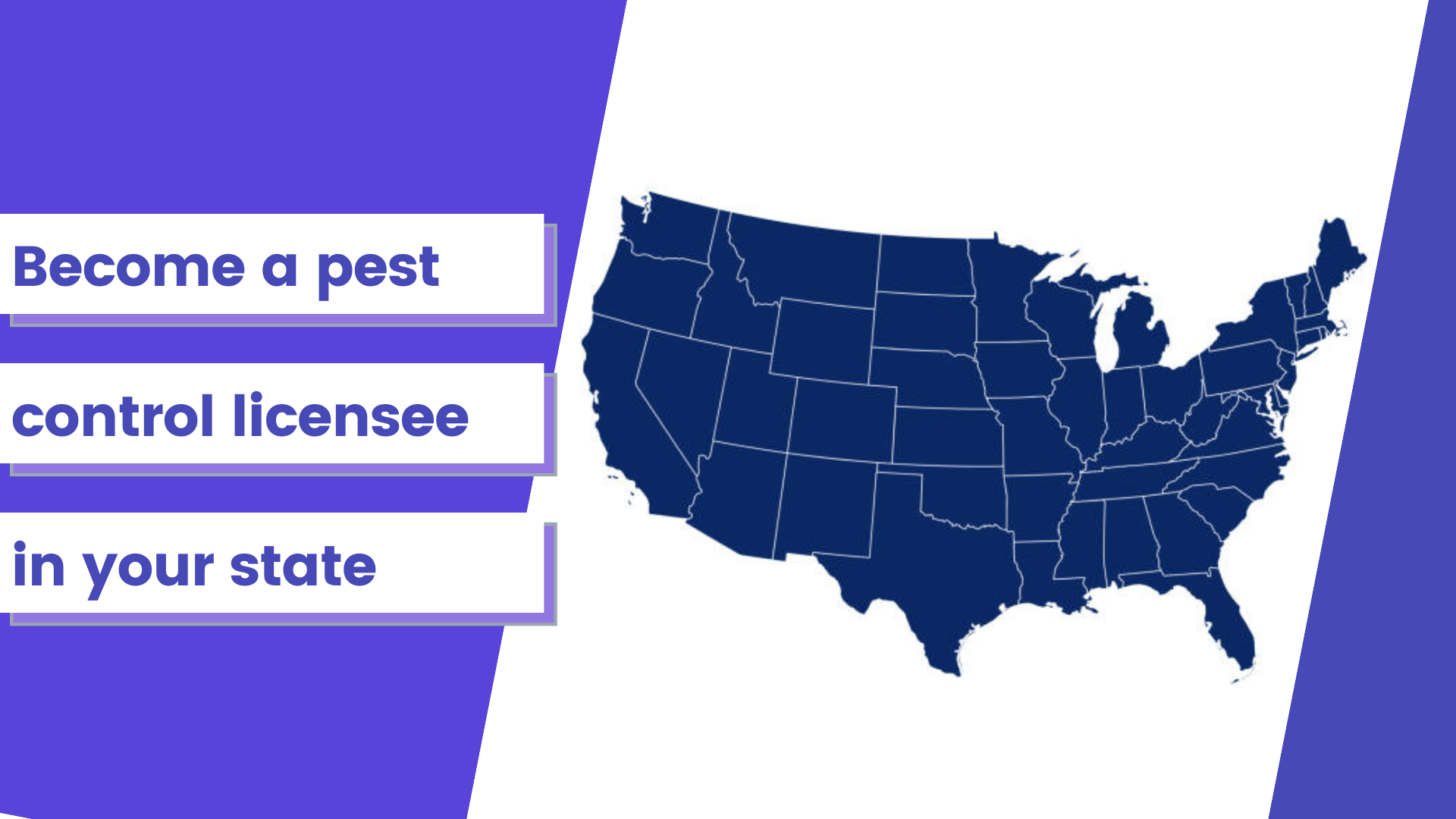Your pest control license: the how, what and why
GorillaDesk Staff

Congrats: If you’re looking into how to obtain a pest control license, then you know what abundance of opportunities await you on the other side of the process. Whether you’re exploring a fresh career path in a new industry, work in pest control already, and you’re looking to expand the realm of possibilities, or you’ve got that entrepreneurial bug and you’re itching to branch out on your own, licensure can map you into a promising future.
Why get a pest control license?
Not only will pesticide licensing ultimately grow your feeling of fulfillment, but chances are you’ll inevitably see more client referrals, professional networking, and collaboration opportunities … even new business ventures. Let’s not forget the legal compliance, liability protection and enhanced reputation that comes with a license, too. Consider the possibilities:
A) Career advancement:
Many employers prefer to hire or promote individuals who are licensed because it demonstrates a higher level of commitment, expertise, and professionalism. With a license, you may qualify for higher-paying positions, managerial roles, or opportunities to specialize in specific areas of pest control.
B) Personal development:
Expand your knowledge, skills, and competencies. Because you’ll most likely undergo formal training and education, you’ll deepen your understanding of pest biology, management techniques, and pesticide safety.
C) Increased job security:
In some cases, working without a license may leave individuals vulnerable to job instability or termination. Obtaining a license can better safeguard your employment status and ensure your long-term viability within the industry.
D) Expanded opportunities:
As a licensed professional, you may see access to a wider variety of employers, including government agencies, educational institutions, research organizations, and non-profit organizations. Plus, certain licenses can open eligibility to work in specialized areas such as agricultural pest management, wildlife control, or public health pest control. And even better, Start your own thing. (Stay tuned in the future for more on starting a business and licensing involved.)
E) Entrepreneurship:
With a license, you’ll have the credibility and qualifications you need to obtain business permits, insurance coverage, and regulatory approvals. Imagine establishing your own local pest control company, exploring franchise opportunities, or providing consulting services.
F) Legal compliance and liability protection:
Why not play it safe, right? While it’s, of course, perfectly possible to work legally for a pest control business without a pesticide license, you do risk the chance of regulatory changes or enforcement actions that could affect your employment status. Getting licensed ensures your compliance with current regulations and protects you from potential legal liabilities associated with practicing without proper credentials. Taking this proactive approach can mitigate risks and provide you with peace of mind for both you and your current or potential employers.
G) Professional reputation:
Enhance your professional reputation and credibility within the industry. Licensed professionals are perceived as more trustworthy, knowledgeable, and competent by customers, colleagues, and stakeholders.
Wondering: What is a pest control license?
In the event that you may be exploring uncharted territory and unfamiliar with what a pest control license is, think of it as your legal authorization granted by a government or regulatory agency that allows you or your company to perform pest control services within a specific area. It ensures you’ve met certain requirements like training and experience and that you’ve demonstrated knowledge of pesticide control, practices, and safety.
Types of pest control licenses
Licensing for each state is governed by its own regulatory body(ies), so licensure can vary a bit across the board (many choose to get licensed in more than one state, especially if travel is easy or they live in close proximity to the state borders). The type of certified applicator, commercial applicator — among many more avenues — pesticide license you choose will depend upon the career path you’re interested in according to your personal interests and skills, professional goals, market demand, and the training you’ve already had.
Typically, while exact categories of pest control licenses may differ in each state, these are the common types of licenses and specializations:
A) Structural Pest Control License:
Authorizes individuals to manage pests that infest structures like homes, buildings, and other man-made structures. Structural pest control licenses may include categories for general pest control, termite control, rodent control, and wildlife control within structures.
B) Agricultural Pest Control License:
It focuses on managing pests that affect crops, livestock, and agricultural production. Professionals with agricultural pest control licenses may specialize in crop protection and integrated pest management (IPM) for farms, orchards, vineyards, or livestock facilities.
C) Public Health Pest Control License:
Geared towards controlling pests that pose threats to public health and safety, such as mosquitoes, ticks, and other disease vectors. Licensed professionals in this category may work in vector control districts, public health departments, or agencies responsible for controlling pests in parks, recreational areas, and urban environments.
D) Fumigation License:
Authorizes individuals to perform structural fumigation services, which involve using gaseous pesticides to eliminate pests within enclosed spaces. Professionals with fumigation licenses undergo specialized training in handling fumigants safely and effectively.
E) Wood-Destroying Organism (WDO) Inspector License:
Specific to inspecting and identifying wood-destroying pests such as termites, carpenter ants, and wood-boring beetles. Professionals with this license typically assess structures for signs of wood-destroying organisms and provide recommendations for treatment and prevention.
F) Pesticide Applicator License:
Authorizes individuals to apply pesticides for pest control purposes. A certified applicator license may be categorized based on the type of pesticide application (e.g., aerial, ground, aquatic) or the specific pests targeted (e.g., general pests, agricultural pests, ornamental pests).
G) Commercial Pest Control Operator License:
Typically required for individuals or businesses that provide pest control services for hire. These licenses may encompass various aspects of pest management, including inspection, treatment, and ongoing maintenance.
If you’re still wondering exactly how to obtain a pest control license …
Pest control license requirements
Specific requirements also vary from state to state, but for the most part, are as follows:
A) Minimum age: Applicants must usually be at least 18 years old to apply for a pest control license.
B) Good character: Applicants may need to demonstrate good moral character, which can involve passing a background check or providing character references.
C) Education and training: Most states require completion of a certain level of education or training related to pest control. This may include attending approved courses, workshops, or training programs covering topics such as pest biology, pesticide safety, and application techniques.
D) Experience: Some states require a certain amount of hands-on experience working in the pest control industry before obtaining a license (which may need to be verified by an employer or supervisor). And since many companies who hire you will want to invest in training you in the hopes of keeping you on as a valued member, putting your time in at a pest control business before pursuing a license is always a good idea.
E) Exams: Applicants will most likely need to pass one or more exams to demonstrate knowledge of pest control principles, pesticide safety and relevant regulations. Exams may be administered by state regulatory agencies or third-party organizations approved by the state. Worried about test taking? Don’t be: You’ll find plenty of courses at universities, community colleges, extensions, online courses and study materials to help you prep.
F) Insurance: Depending on the type of license and services offered, applicants may be required to carry liability insurance or demonstrate proof of financial responsibility.
G) Fees: Applying for and renewing a pest control license usually costs one or more small fees. These fees can vary widely depending on the type of license and the state’s fee schedule.
H) Continuing education: Many states require licensed pest control professionals to complete continuing education courses or workshops periodically to maintain their licenses so that you stay up-to-date on the latest pest control techniques, safety practices, and regulatory changes.
I) Business entity registration: If the applicant intends to operate as a business entity (e.g., sole proprietorship, partnership, corporation), additional requirements like business registration, bonding, or incorporation may apply.
J) Compliance with regulations: Applicants must comply with all applicable federal, state, and local regulations governing pest control practices, including pesticide labeling, storage, and disposal requirements.
How to get a pest control license: A step-by-step process
You’ll want to research the specific requirements in your state or jurisdiction. Here are the most common steps you’ll need to take across most states and jurisdictions:
1. Complete required training
2. Gain experience
3. Pass exams
4. Submit your application
5. Pay associated fees
6. Receive your license
7. Renew license upon expiration.
How to get a pesticide license in your state
Your colleagues and some simple Google searches will yield some results, and we know all the information can feel confusing, so to get you started, we’ve gathered all the information you need for obtaining your:
A) Florida pest control license
C) California pest control license
D) Arizona pest control license
How much does pesticide licensing cost?
Associated costs vary according to your location, the type of license you’re seeking, and any other requirements like training and exams. But between the application and exam fees, training expenses, possible background check fees, renewal fees, and any continuing education, your spending becomes a worthwhile investment in a limitless future.
By carefully considering all factors, you’ll make informed decisions about pursuing a pest control license and charting your career path in the industry — after all, it is one of the most valuable investments you can make. So, take the time to research your options, assess your goals, and get ready to embark on your journey toward licensure with confidence. Stay tuned for more career.
Other posts to check out
Make the move from paper to digital: A step-by-step guide for field service pros
If your field service business is still doing business on paper, it’s time to make a change. Here’s how to find success with a move to digital.
Pest control marketing: Let’s make that phone ring
With so many other local pest control companies making competition tight, keeping that phone ringing with new customers may not feel as easy as you thought. To keep your pest control business growing takes marketing know-how. Here are our best tips.
How to get more positive customer feedback
Customers trust online reviews just as much as word of mouth from friends and family. The truth is: Online reviews can make or break your local services business. Here’s how to build that glowing reputation your service deserves.
Tree service marketing: 11+ ideas to drive more customers in 2026
Drive more leads with our ultimate tree service marketing guide! Discover 11+ proven strategies to grow your business and attract the right customers.
How to start a tree service business in 2026
Learn how to start a tree service business with step-by-step guidance on planning, licensing, equipment, marketing, safety, and scaling your company.
Landscaping services list: What to offer your customers
Discover the top landscaping services to offer for maximum profit. From design to maintenance, expand your business with our comprehensive landscaping services list.
Transform your business
Try it free for 14 days. No credit card required. Instant setup.
★★★★★
We will be customers for life
“I can not say enough good things about GorillaDesk it saves us so much time and money. The customer service is the best. I would recommend GorillaDesk to anyone no matter what industry. I trained my employee in 5 minutes on how to use it. We will be customers for life.”

Ryan Sullivan
Business Owner
Ready to Get Started?
Get all our amazing features and top-rated support, with no credit card required.






